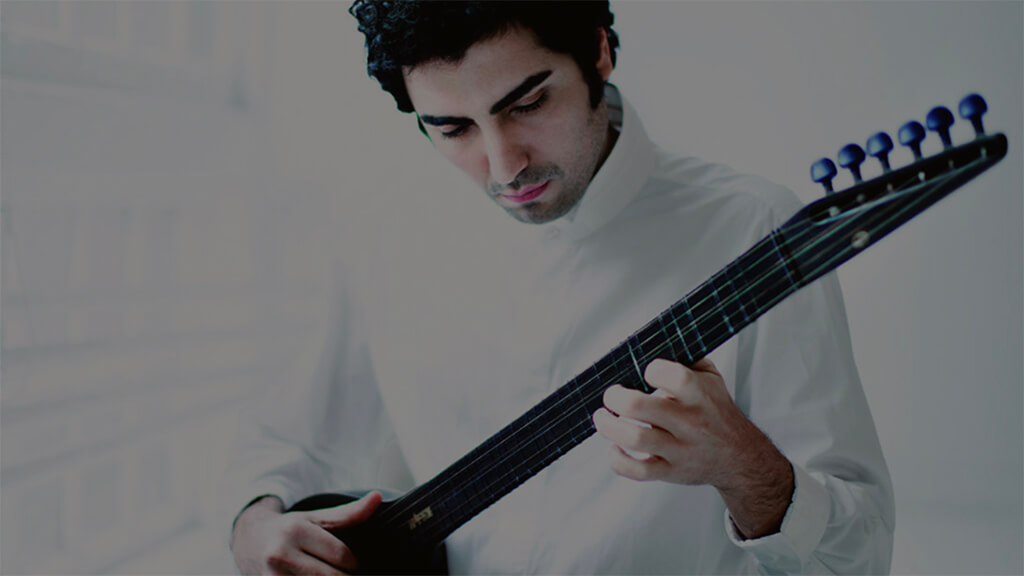
This interview is sponsored by the Small World Music Society.
At this very moment in Iran, its people live under a veiled society.
Hafez Nazeri is a man with a tall build. Even that cannot shield him from persecution: as long as he remains in Iran, this Persian musician lives under constant threat whenever he performs.
“Most of the time when I go out in Iran, I prefer to cover up — I have a hat, I have big glasses for my eyes and eyebrows, I use a cheap car,” he laughs, explaining how passersby would otherwise recognize him on the street.
“I’m not very comfortable,” he continues, “I feel Iranians look at me as an outsider sometimes.”
Societal rifts are abundant in Iran. For example, there is an unwritten policy that women cannot sing in public.
Nazeri responded by engaging female singers for his Rumi Symphony Orchestra.
“Look, you can’t be against them,” Nazeri explains. “Music is the sound of God — you cannot prohibit women of singing, and if you do you’re against God, whom you prize so much.”
None of this sits well with the Iranian government — a handful of times, they have shut down his performances on the day of the show.
In building bridges, Nazeri has become a polarizing figure in his homeland. He’s the son of a well-respected Iranian singer, but even that doesn’t grant him immunity from spiteful action.
“[Iranian musicians] feel like if you touch the tradition, ‘Oh my God!’ you are destroying everything — humanity and the universe are going to be destroyed!”
An intuitive musician, Nazeri’s musical development began in his late teens as he performed alongside his father, singer Shahram Nazeri. In his early twenties, young Hafez followed his creative impulses to New York City to pursue western classical music. He studied composition and orchestral conducting at the Mannes School of Music for seven years, where his idea for Rumi Symphony Orchestra hatched.
Media appearances soon followed: music from the Rumi Symphony Project has been broadcasted on CNN, ABC and Fox TV. The crowning achievement of Nazeri’s time in the United States was the launch of the Rumi Project CD series: after 5,000 hours in the recording studio and five years of preparation, the first volume was released on the Sony Classical label.
Returning to Iran with the Rumi Symphony Orchestra, Nazeri also gained a quick following — but not in the way he wanted. Aside from government shutdowns of concerts, major critics refer to his music as “nothing” and “propaganda” with “nothing new to offer.”
Nazeri remembers it to be a hard period with Iran’s “musical establishment,” an elite circle which he had been born into. Against the odds, his project still managed to grow: by his count, nearly 300,000 people attended the Rumi Symphony Project CD tour across Iran — a record for the biggest concert tour in the history of Iranian music. In contrast to the senior “establishment,” the audience tended to be between 20 and 30 years old.
Younger generations seem to identify with the Rumi Symphony Orchestra’s philosophy: not just playing music for light entertainment: their goal is to foster a safe space of love and unity wherever they perform.
The orchestra members perform Western-sounding selections set to poetry in the Farsi language. Audiences will see familiar instruments like the violin, viola, cello and percussion, played by Nazeri and his father; of course, females are holding their own in soprano and mezzo-soprano roles.
Nazeri is particularly proud of his own innovation, a readapted Persian setar.
The setar looks similar to the Indian sitar, but Nazeri has made key changes to bring a 2,000-year-old instrument into the present day.
“People persisted with its shortcomings for thousands of years,” he explains. “The sound of the setar is not enough for two people, but too much for one person.
And modernize the instrument he did: two bass strings were added to expand the instrumental range four-or-fivefold. New tuning pegs shortened performance preparation time to a few seconds. With 17 extra chromatic pitches and the ability to play more than one musical line, Nazeri says this will encourage composers to open up their imagination.
“If you wanted to compare our music to Western classical music, when Persian musicians sit with one instrument, they close their eyes and they improvise and they try basically to translate the time and the moment into music,” Nazeri says.
“In our music, the older you become, the better you get. The music is not only about technique and all of that – it’s about the spiritual journey.”
He ruminates: “You just close your eyes, and the music is in your head. You just play — God knows how and God knows what.”
Shahram Nazeri and Hafez Nazeri will perform at the Sony Centre on October 21. They will play selections from Untold — A New Beginning alongside musicians from Rumi Symphony Orchestra. Tickets are available here.
- LISZTS | 10 Reasons To Miss A Performance - April 24, 2019
- INTERVIEW | Nico Muhly: Opera’s Renaissance Man - November 8, 2018
- INTERVIEW | How An Iranian Musician Has Created A Revolution In Persian Classical Music - October 7, 2018



